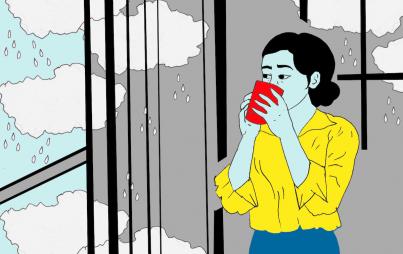
Not everyone is gonna fit in a zen box. (Image Credit: Thinkstock)
When I left my emotionally abusive ex, a friend from graduate school sent me some poems she had written. My friend had gone through a similarly dysfunctional relationship and had documented its breakdown in writing. She was composing what she called “Fuck You Poems," which were exactly what it says on the label. Opening the document, I was ecstatic. Some gems included, “If you want to sober up, I won’t hide the alcohol,” “If you need money, I will laugh,” and, my personal favorite, “If you want empathy, I will talk to the cat.” I feared her words would encourage catharsis, acceptance, and ultimately forgiveness. I have never been happier to be wrong.
I do not think I can forgive my abuser. Frankly, I am unwilling to try.
Forgiveness is a virtue exalted in our culture, but I do not fit into any Zen portrait of clemency. I do not think fitting into said portrait should be a prerequisite for healing. The benefits of forgiveness are questionable. Forgiving one’s partner for indiscretions does not necessarily improve relationships. One 4-year longitudinal study indicated forgiving aggressive behaviors encouraged the offending partner to continue such behaviors. Forgiving in the aftermath of a relationship also has debatable merit. Forgiveness inherently requires releasing anger. While anger is a sentiment traditionally discouraged, our emotions do not exist on a strict continuum ranging from positive to negative. Anger is like any other emotion — neutral, in and of itself, but important to process. An overemphasis on forgiveness represses this emotional response, rather than addressing it in a healthy fashion.
Anger is not a color society likes on women. Angry women are emotional, irrational, out-of-control, wild with excitement that renders them wholly undependable. An Arizona State study once made participants watch a computer simulation of jury deliberations. Angry women in the jury were perceived as less trustworthy, while their angry male counterparts could often sway participants’ opinions.
Some may certainly find catharsis in forgiveness. I would never fault anyone for feeling it was, personally, a healthy choice for them. I just resent the notion the act should be mandatory, and that those who forgo it are missing a vital step to healing.
In her essay “I’m Mad At You Because You’re An Idiot, Not Because I’m a Woman,” Litsa Dremousis writes of typical male reaction to her anger. She recalls two situations in which men grossly violated her personal boundaries and were shocked by her outrage, expecting her to “remain amiable, though by any objective measurement, that expectation was ludicrous.”
I felt this same pressure to veer towards amiability when I left my abuser. My ex was sick, people said, and pity was better than hostility. I was expected to walk in his shoes, rather than respond with proportionate anger.
Some may certainly find catharsis in forgiveness. I would never fault anyone for feeling it was, personally, a healthy choice for them. I just resent the notion the act should be mandatory, and that those who forgo it are missing a vital step to healing.
I do not choose forgiveness.
I cannot forgive, forget, and within this self-imposed amnesia, abandon my personal outrage. I will be a little angry and a little bitter for the rest of my life. Healing will not be about letting go of anger, but rather integrating it as smoothly as possible into my sense of self.
When I was young, I fetishized forgiveness. I pinned up quotes on forgiveness, mostly falsely attributed to Gandhi, onto the bulletin board in my room. Later, I realized my early adoration of the act was related to my womanhood.
An avid reader, I inhaled the canon. Steinbeck and Dostoevsky were my adolescent idols. The heavy-handedness of Steinbeck’s symbolism, as subtle as Charles Dickens naming the bad guy from Hard Times Mr. M’Choakumchild, taught me metaphor. The Gabilan Mountains are a symbol of good and evil — dark mountains in one direction, bright mountains in the other.
The passage I loved most ardently, underlined repetitively, was a sudden break from the narrative, in which Steinbeck offered insight on human nature. He wrote, “Underneath their topmost layers of frailty men want to be good and want to be loved. Indeed, most of their vices are attempted shortcuts to love.” This line has done me immeasurable damage. This is not because it is untrue. Most people do crave the validation of love, and many missteps may be in pursuit of that. However, an act motivated by this desire can still be inexcusable.
I was harmed by Steinbeck’s words not because I believed them, but because I believed them to be exonerating.
Empathy need not always translate to forgiveness.
Then, there was Crime and Punishment and Sonia Marmeladov, created by a dedicated, if ambivalent, Christian. She was a walking, talking Christ allusion, able to forgive a stone-cold murderer. Sonia forgiving Raskolnikov was on par with God’s forgiveness, her grace redemption. Sonia had no wants or needs of her own, her purpose only to guide Raskolnikov. Compare her then to Steinbeck’s female lead in East of Eden — Cathy, a metaphor for the devil, who runs a whorehouse and chews with her front teeth like an animal.
I did not get much wiggle room here. It was the Madonna or the literal Whore. I failed to see nuance, realize that we live between Steinbeck’s mountains, not wholly on one side or the other.
I tried, once, to empathize with my ex. After leaving him, I ruminated over his first outburst. If I could understand that, perhaps I could understand and, in turn, forgive.
It occurred at a party. I was talking to a friend about awkward sex and, in the process, recounted the only one-night-stand of my life. My ex promptly left the party and went to sit on the bench outside. I stepped out to talk to him and, while he was shaken up, he seemed generally calm. He had been cheated on before, he said, and therefore my past made him insecure. After some discussion, a few apologies, he agreed to come back inside. All was well until, on the porch staircase, he turned to kiss me.
I am afraid of falling down stairs. My brothers and I used to play a game called “Stair Jumping” as kids, which was exactly as asinine and dangerous as it sounds. When my ex reeled around, I flinched. It was an involuntary flicker of pain, nothing sinister behind it save memories of stupid youthful behaviors, but it triggered a sudden, violent change.
“Fuck you!” he screamed, “You don’t flinch when I try to kiss you.”
He pushed past me and stormed into the backyard, pulling at his hair while spouting a string of "fuck-you’s" and "go-fuck-yourselves," in between throaty noises that sounded like a winded dog barking. I began to cry. Never in my life had anyone spoken to me like that.
“Fuck you. You don’t cry right now.”
“What did I do?” I sobbed.
“You let that scumbag manhandle you,” he said, “You slept with that asshole and you flinch when I try to kiss you. I shower you with affection. I treat you like a princess.”
There it was. I primed him for outrage. It had nothing to do with flinching. If that had not set him off, something else would have. Someone got to me first. He had treated me right, paid me compliments, done all the things he was taught to do to win a woman’s favor, and I was still capable of being occasionally uncomfortable with him. He had been nice, in all the conventional ways, but was not rewarded with 24/7 access to my body.
It was hours before the screaming stopped and days before the half-assed apology — “I’m sorry, but you hurt me so much I was out of control. I didn’t know what I was saying.”
That night though, he went back into the apartment. He calmly told everyone I had too much to drink and said his polite goodbyes. This is not how an out-of-control person behaves.
I developed a theory for his behavior. His discomfort with sex was palpable. His parents divorced due to his father’s infidelity and his mother never dated again. She was a subservient, sexless single mom, her life revolving around her son, while his father’s sexual whims destroyed the family. My ex saw sexuality, especially outside the confines of traditional relationships, as threatening. His fear prohibited happy, healthy sexual relationships, and so he developed a defense mechanism. He wasn’t missing out. He was simply better, more respectable, than those who acted on impulsive urges. He did not have one-night stands, he once said. The only women he slept with only once abandoned him, rejected his offer of romance in wake of copulation. He had a hunger in him, a raw desperation to be loved in an all-encompassing fashion.
He wanted a shortcut. He locked in partners by negating their past, convincing them it had all been damaging, while he represented devotion and decorum. To be with him was to erase who you were before. By eliminating the past, he forced himself onto a pedestal.
I understand this intellectually. I did what people suggested, took that walk in his shoes, and saw, objectively, he was so unhappy, so pitiable. But, here’s the thing. Taking shortcuts to love does, in fact, make you a bad person. Love is hard, and must build over time, and there are no real shortcuts. Understanding was cathartic. I wanted, at least, a story to explain my experience. It did not quell my rage.
How can I not be angry? I still spend days crying, slapping myself in the face, hyperventilating, screaming at my reflection. I still feel shame. I am not perfect. I did and said things that hurt him, which I deeply regret, while he gets the privilege of existing without regret. His apologies never came without caveats. He never treated me well. He did not grow or change or learn, and staying as long as I did was irreparably damaging. He took away my ability to love without fear, robbed me of much of my strength and self-resolve, and changed me into an unrecognizable version of myself, drained of ambition, hope, and the same capacity for joy. Despite my relative youth, some days I feel many aspects of my life are effectively over due to the damage accrued. And I took all that damage.
I will always hate him for this. I am not going to forgive him. I’ll write “Fuck You” poems instead, because fuck him. I am not his personal Jesus. I’d rather operate the whorehouse.
Then again, I am not the metaphorical whore just by virtue of my anger.
My graduate school friend is one of the most likable people I know. She is fun, friendly, kind. She loves her cat, her niece, and her family. She sends me emails that make me feel good about myself. She consistently exudes positivity and charm. She is all of these things, while still being angry.
I will always carry anger. I will also always make homemade cards and cakes for birthday parties, sing songs to my cats, write kind emails to loved ones. Anger can be part of me without defining me.
I told my friend my ex was jealous of my cat, felt my affection for Murphy was disproportionate to my affection for him (as if a grown man needs someone to scratch him behind the ears and call him a handsome prince). She wrote back, “You are the best partner to have because you love other creatures.”
My ex did not understand love, fondness, and desire are not finite, and a solitary relationship cannot negate someone’s past and present passions. This black and white thinking, this inability to see nuance, reminds me of myself as a young reader. I was twelve, though. What’s his excuse? He is old enough to know better and unlikely to change. Why forgive someone who lacks the mental capacity to understand their wrongdoing?
If he wants empathy, I’ll talk to my cat.








